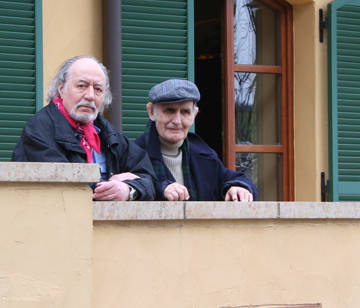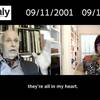Dear Letissia... Remembering John
What happens when an Italian abroad like me meets an American who is so Italian like John Cappelli? I’ll share it with you, looking back over my memories. John passed away a few hours ago. He was recovering in a hospital upstate where he had just undergone a major operation.
Yes, it was six years ago, or perhaps more, when I met John for the first time. He had just celebrated the 50th anniversary of his professional career, and I had to write about his life for America Oggi.
I see him from afar, and I recognize him even if I don’t know him. Under a statue in the courtyard of the United Nations, he’s a very thin man who wears a cap low on his head. He looks around with sparkling, curious, and extraordinarily kind eyes.
Besides his eyes, I notice his smile. Open, simple, and almost like a child. And it is with this child-like enthusiasm that John Cappelli immediately takes me by the hand to show me around the U.N. “His” U.N., where he had worked as a reporter for many years.
As he walks through one corridor and then another, he’s lively; he tells stories and the walls seem to follow him. His words become images.
John Cappelli almost prefers to not talk about himself, but would rather discuss the world, and most of all, journalism, the journalism of a reporter who puts the facts before anything else.
He takes me to his office, on the third floor if I recall correctly. Most of all, I remember the smell of humid papers, the heaviness of the typewriter, and an enormous printer, the likes of which you won’t find anymore. And then there are so many books, newspapers, notes. It’s a mess. John didn’t really use that room anymore, but the atmosphere from years before still hung in the air. It lived there.
He began his story at the very beginning. He was born in 1927 in
He actively participated in the war as an anti-Fascist, many times putting his own life at risk. He delivered information to American military troops hidden in the
I imagine John as a young man in the mountains. I think of Leone Ginzburg, slain by Nazi-Fascists. As he speaks, he defines himself with pride: the last of the communists.
He returned to the
“Lettissia…,” John continues to reminisce.
And at this point, John’s words become increasingly intense, more words of a journalist. The stories that he tells are alive; he seems to experience them in the present moment, even though they span decades. Political and scientific figures, heads of states, and kings unfold before me.
That day I spent several hours with him. It was the first of many meetings that took place whenever he came to
Lettissia… that day, so many events, names, stories. From
He also spoke of his colleagues with pride, from RAI’s Antonello Marescalchi, to Furio Colombo, Ugo Stille, Ruggero Orlando, Oriana Fallaci, Gaetano Scardocchia, Gastone Orefice, Rodolfo Brancoli… and David Horowiz.
And then he told me what his boss Fausto Coen said to him: “I like your American style of journalism: terse and not verbose.”
He was the first to tell me the story of Carlo Tresca and many other Italian-Americans.
I looked among my papers for the article he wrote at the time. I still haven’t found it. But I realize that I don’t need to re-read it in order to properly recall our first meeting.
“Letissia… we were already friends. It truly was love at first sight,” John continued. It was because of what he referred to as “his stroke” that he had trouble pronouncing the “z” in my name. Letissia…it was so sweet.
From that point on, he always called me Letissia even in written form.
And from then on he wrote to me practically every day to comment on events and articles with his unfailing irony. His emails always began with “Letissia…,” and they closed with a sweet, “Your John” that I will never forget.
I will miss you, John. Letissia bids farewell to the last communist.






































i-Italy
Facebook
Google+
This work may not be reproduced, in whole or in part, without prior written permission.
Questo lavoro non può essere riprodotto, in tutto o in parte, senza permesso scritto.